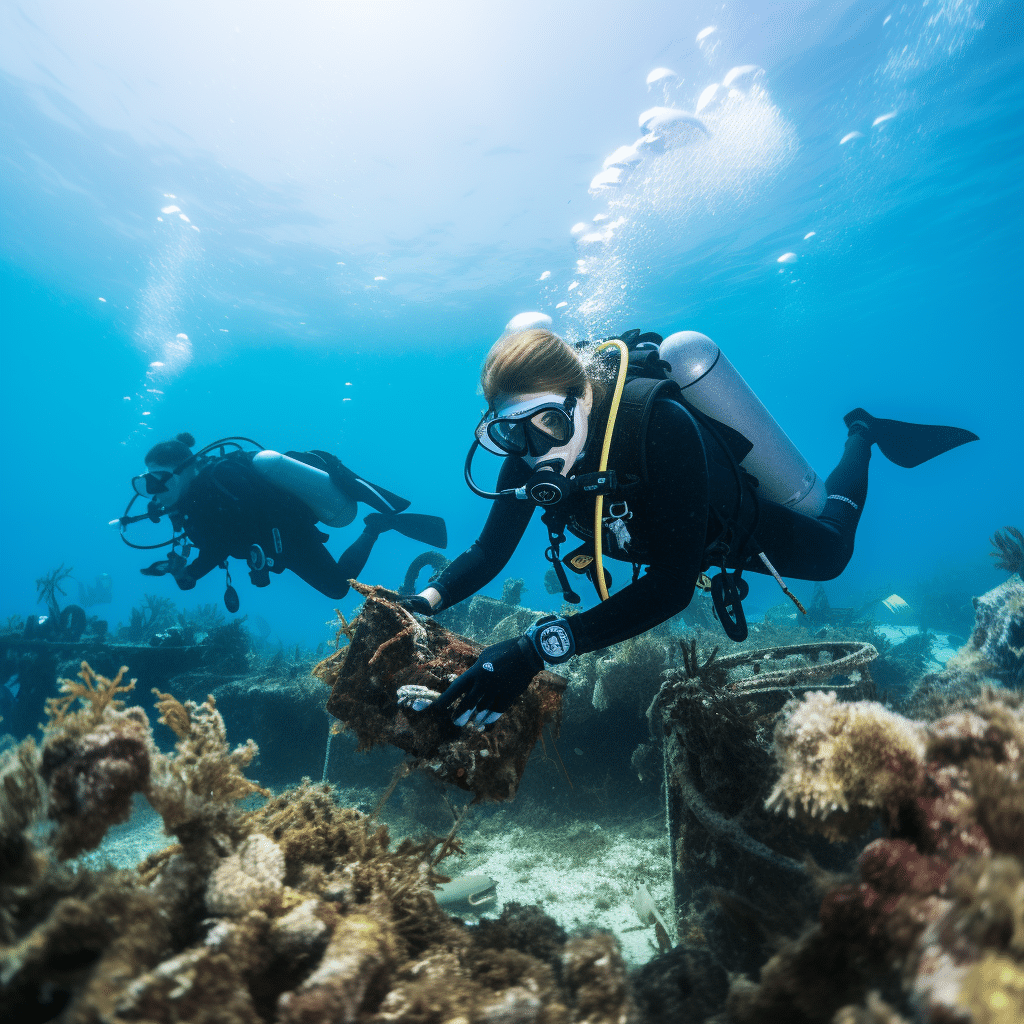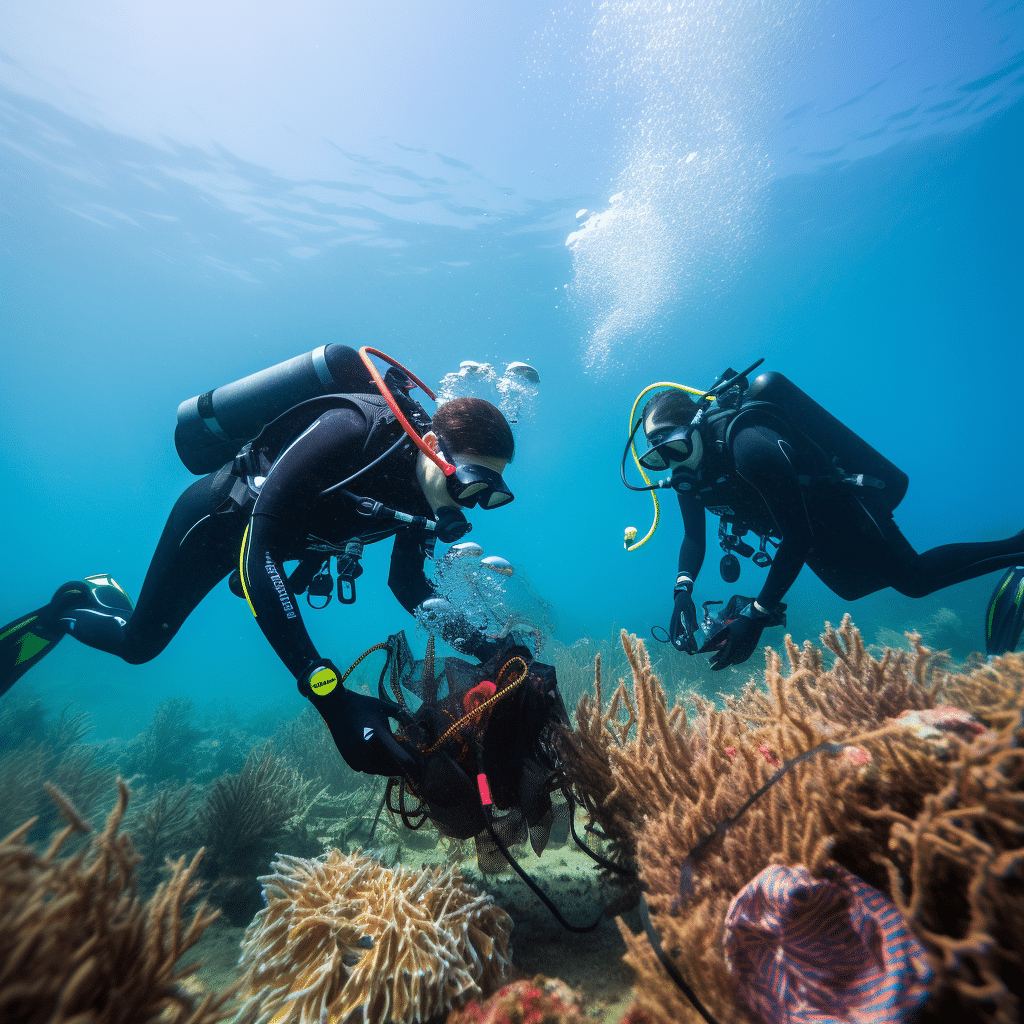Volunteer opportunities, Divers passionate about marine conservation have many volunteer options. They can join organizations focused on conservation efforts, or take part in underwater clean-ups. Removing trash and pollutants from the ocean floor helps improve the ecosystem. Divers can also contribute to coral reef restoration projects. They should ensure they have the necessary skills and certifications, to get involved in more projects. Safety is important, by following guidelines provided by the organizations.
Importance of Marine Conservation

Marine conservation is vital for preserving the delicate balance of our oceans and their biodiversity. It safeguards ecosystems and protects endangered species, ensuring sustainability of resources.
Divers have a special chance to contribute to these efforts. Through volunteer programs, they can do activities like reef clean-ups, species monitoring, and habitat restoration. This allows them to see the effects of human activities on marine environments and make a real difference.
Volunteer divers also help with data collection and research. They document underwater ecosystems and biodiversity through surveys and scientific studies. This info assists conservation strategies at all levels.
The Coral Restoration Foundation is succeeding in restoring coral reefs. They cultivate coral fragments in underwater nurseries, helping revive damaged reef systems and providing habitats for many marine species.
By taking part in marine conservation volunteer projects, divers can become active supporters of safeguarding our oceans. They can encourage others to join this cause, so future generations can experience the wonders of our underwater world.
Benefits of Volunteering in Marine Conservation
Volunteering in marine conservation has rewards both for individuals and the environment. It’s gratifying to help protect the ocean’s ecosystems. Plus, volunteers get hands-on experience with marine life and conservation practices.
Physical fitness can also be improved, since diving needs strength and agility. And, by volunteering, you become part of a larger community that is devoted to protecting the oceans. Furthermore, you can work with experts and scientists, widening your network and making professional connections.
You may also sharpen skills such as teamwork, leadership, and problem-solving. Volunteering gives people a chance to raise awareness about marine conservation in their communities.
A helpful tip for volunteers in marine conservation is to stay informed about the latest research and developments. This will help them to understand better the value of their work and to share relevant info with those who are keen to participate.
Types of Volunteer Opportunities for Divers in Marine Conservation
Divers, who are keen on marine conservation, have many ways to help. Here are five roles they can take up:
- Coral Reef Monitoring: Divers can help scientists by collecting data on changes in the ecosystem and spotting threats, such as pollution and bleaching.
- Marine Wildlife Surveys: Assisting researchers in understanding the population and behavior of species like sharks, turtles, dolphins, and manta rays.
- Underwater Clean-up Campaigns: Taking out debris and fishing gear that endanger creatures and damage habitats.
- Artificial Reef Construction: Building havens for diverse marine organisms and aiding ecosystem recovery, while providing sustainable diving opportunities.
- Education and Outreach Programs: Spreading awareness through educational programs to make people understand the need for protection.
These activities give divers the opportunity to experience the beauty of the underwater world and be a part of preserving biodiversity. However, before taking on any volunteer opportunity, make sure you have the right training and certifications. Safety is always essential.
Finding Volunteer Programs and Organizations
When it comes to volunteering for marine conservation, there are several options. Here’s what to think about:
- Look online: Use search engines and websites that connect you with marine conservation organizations.
- Speak to local dive shops: They may have information about local initiatives and advice on volunteering.
- Attend marine conservation events: Network with like-minded people and learn about volunteer programs.
- Connect with environmental organizations: They may have specific programs that include volunteering.
- Join citizen science projects: Contribute data while supporting marine conservation.
- Check out international programs: Volunteer abroad for unique experiences.
It’s important to research each program or organization before you decide. Get to know their mission, goals, and previous impact. Additionally, take into account factors like travel costs, accommodation, and time commitments.
If you do all this, you’ll find great volunteering opportunities that not only help marine conservation, but also give you memorable underwater experiences. So get ready to make a difference and dive into marine conservation volunteering!
How to Prepare for Volunteer Opportunities in Marine Conservation

Prepare for volunteer work in marine conservation with a well-thought-out process. These four tips will assist you in making a significant contribution:
- Research: Find organizations that offer marine conservation volunteer roles that fit your values and aspirations. Take note of the projects and qualifications necessary.
- Training and Certification: Some volunteer positions need specific training or certification. Look into certifications like PADI Open Water Diver or Advanced Open Water Diver to improve your skills and boost selection chances.
- Experience: Build experience by joining local conservation efforts or volunteering at aquariums, marine research centers, or wildlife rehabilitation facilities. This will show commitment and build skills for future volunteer roles.
- Personal Prep: Get yourself physically and mentally ready for volunteer roles. Exercise regularly and stay informed about current environmental challenges in marine ecosystems. Also, familiarize yourself with local regulations and ethical standards to keep everyone safe and protect the ecosystem.
Sarah and David are inspiring examples of thorough preparation for marine conservation volunteering. They got advanced diving certifications and did beach clean-ups and habitat restoration. Their dedication paid off when they were chosen for a critical coral reef monitoring mission.
Their story highlights the importance of gaining skills, experience, and knowledge before participating in this important field. Follow their footsteps and make a lasting impact on our marine ecosystems.
Conclusion
Divers keen to help marine conservation have multiple volunteer options. Popular ones are coral reef restoration, collecting data on marine species, and beach clean-ups. These give divers a way to take part in conserving marine ecosystems.
Coral reef restoration involves transplanting coral fragments and observing their growth. Collecting data on marine species helps researchers understand marine biodiversity and make conservation decisions. Beach clean-ups remove debris from coastlines, protecting marine life and raising awareness about humans’ effect on oceans.
Individuals can get involved in these projects by contacting local diving organizations, environmental groups, or research institutions. They should follow the organizations’ safety guidelines to avoid hurting fragile marine ecosystems.
Volunteering is a great way for divers to use their diving skills and passion to make a lasting difference in our oceans’ health and biodiversity.
Frequently Asked Questions
Q: Are there any volunteer opportunities for divers in marine conservation?
A: Yes, there are several volunteer opportunities available for divers in marine conservation. Many organizations around the world actively seek volunteers to help protect and preserve marine ecosystems.
Q: What kind of volunteer work can divers do in marine conservation?
A: Divers can participate in various activities such as underwater cleanups, reef monitoring, marine species surveys, coral restoration, research data collection, and educational outreach programs.
Q: Do I need to be a certified diver to volunteer in marine conservation?
A: In most cases, organizations prefer volunteers to have at least a basic scuba diving certification. However, certain projects may offer training and certification opportunities for non-divers who are interested in participating in marine conservation efforts.
Q: How do I find volunteer opportunities for divers in marine conservation?
A: You can start by researching established marine conservation organizations, both locally and globally. Websites, online directories, and social media platforms dedicated to volunteering can also provide information on available opportunities.
Q: Are there any costs involved in volunteering as a diver in marine conservation?
A: While some organizations may require volunteers to cover their own expenses such as travel, accommodation, and equipment, there are also initiatives that provide funding or offer scholarships to support volunteers in their efforts.
Q: Can I volunteer as a diver in marine conservation if I don’t have my own diving gear?
A: Yes, many organizations provide necessary diving equipment to volunteers. However, it is advisable to check with the specific organization beforehand to ensure the availability of equipment and any potential requirements.
